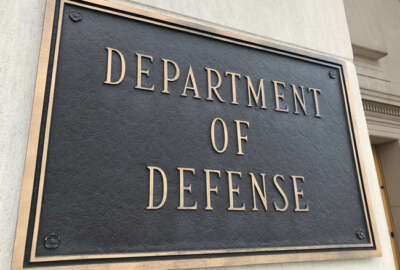

One aspect of the Independent Review Committee on Sexual Assault in the Military is getting a lot of attention, but there are more than 80 recommendations in all.
The possibility of taking nonmilitary and sex crimes out of the chain of command has dominated headlines and gotten the most attention of military officials, but members of the Independent Review Committee on Sexual Assault in the Military are warning that adjudication is just one small piece of the puzzle.
Congressional attention has largely been focused on just one section of the commission’s nearly 300-page report, however, members of the panel say without implementing other recommendations, the military’s response to sexual assault and harassment will fall flat.
“Our recommendations are really designed as a comprehensive and complimentary package to one another, these are not designed to be one standalone recommendation and forget the other ones,” Kayla Williams, one of the commissioners, said during a Center for a New American Security event on Wednesday. “There’s a lot more meat on the bones than just changing the legal structure.”
At this point, the Defense Department has set up a task force to look into implementing the more than 80 recommendations set forth by the commission. Deputy Defense Secretary Kathleen Hicks is leading that task force and its findings are due in September.
DoD has already implemented some changes by adding sexual harassment as an offense in the Uniform Code of Military Justice and creating offices in each military department to handle the prosecution of special crimes, with appropriate legal oversight and guidance from the Pentagon.
It is in the process of solidifying others.
The military services will standardize all non-judicial punishment — a deviation from centuries-long tradition. The services will also establish a separation process for troops with substantiated sexual harassment claims. The military branches will also professionalize career tracks for lawyers and investigators in sexual assault and harassment cases.
“My staff will also be studying how best to implement military protective orders to improve off-base enforcement and mandatory restitution for victims,” Defense Secretary Lloyd Austin wrote when in the commission’s report came out.
However, Williams said more systemic changes laid out in the report need to be put into place.
She said there is a “big bucket” of recommendations around prevention, rather than prosecution.
“Far too often, prevention and response are conflated with one another, and most commanders actually don’t understand how to do prevention, they do a lot of awareness raising, but actual prevention is a public health science of how to stop behavior before it gets it gets worse,” Williams said.
The commission is pushing for DoD to professionalize the prevention workforce to aid commanders.
Another area of vital importance, according to the commission, is actually understanding the problem. The commission found that DoD does not have any way of tracking cyber harassment and often commanders are unaware of new trends and language in how people are harassed.
“Educating our command teams on how to engage with the cyber domain is a key part of what we also have to do as part of developing and selecting those correct leaders,” Williams said.
In 2017, the military made it a fireable offense to share nude photos of another service member. However, DoD does not keep statistics on cyber harassment. Marine Corps leaders were shocked to find that service members may have been sharing sexually-explicit photos of service members for years, and commenting derogatorily about them.
“I remember very vividly after the Marines United scandal in 2015 the commandant of the Marine Corps being visibly shaken from having no idea something like this could happen online,” Williams said. “It’s a generational difference but I think is exacerbated when we talk about a lack of diversity there.”
The commission is recommending climate surveys and more generational and ethnic diversity to understand the issue.
Congress is also adding in some provisions to the 2022 defense authorization bill that will help implement other recommendations from the commission. The Senate Armed Services Committee wants to create a help hotline to support sexual assault victims in making reports.
The House Armed Services Military Personnel Subcommittee is recommending a legal officer be present at separation boards and that DoD create a list of civilian victim services for use.
Copyright © 2024 Federal News Network. All rights reserved. This website is not intended for users located within the European Economic Area.
Scott Maucione is a defense reporter for Federal News Network and reports on human capital, workforce and the Defense Department at-large.
Follow @smaucioneWFED
